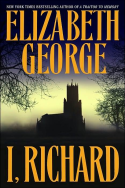 Book description:
Book description:
Hailed by The New York Times as “a master of the British mystery,” award-winning author Elizabeth George is one of our most distinguished writers, cherished by readers on both sides of the Atlantic. Her first collection of short stories is an extraordinary offering that deftly explores the dark side of everyday people—and the lengths to which they will go to get what they want most…
In these five tantalizing and original tales, George plumbs the depths of human nature—and human weakness—as only she can. From the chilling tale of a marriage built on an appalling set of lies that only death can reveal, to the final, title story about a penniless schoolteacher whose ambition turns murderous, I, Richard is filled with page-turning drama, danger, and unmatched suspense.
Whether the setting is urban or suburban, affluent or middle class, no one is safe from menace. Thanks to Inspector Thomas Lynley, a squabbling group of Anglophiles discovers a killer in its midst. But little help is on hand when a picture-perfect town is shattered by an eccentric new resident’s horrifying pet project. And when a wealthy husband is haunted by suspicions about his much-younger wife, it becomes clear that a man’s imagination can be his own worst enemy…
Review:
Well. That was different! And not, I’m afraid, in a terribly good way. I’ve furnished ample avidence of my admiration for George’s mystery novels in the past (and intend to read more of them in future), but I wasn’t too enamored of these short stories, primarily because most are variations on the theme of “things go wrong for the unsympathetic protagonist.” And that is not my favorite theme upon which to dwell. But let us forge onward into specifics!
“Exposure” is a rewrite of an earlier story, “The Evidence Exposed.” It concerns a group of Americans taking a summer course in The History of British Architecture who have come to Abinger Manor, residence of Detective Inspector Thomas Lynley’s aunt, for a tour. The characters are the highlight of this one, and though the crime is rather silly and the culprit’s motive murky, I still rather liked some of the quick portraits painted of those enrolled in the class. Lynley doesn’t get much to do, though, and poor Helen is relegated to being charming without actually, if I recall rightly, having a line of dialogue.
“The Surprise of His Life” is, ironically, possessed of an utterly predictable conclusion. After a lengthy introduction, in which George reveals drawing inspiration from the alleged crimes of O. J. Simpson, we meet a wealthy businessman who has begun seeing a psychic. She warns him to expect an external shock, so he goes off into all these flights of fancy about his wife having an affair and hires a private investigator who takes pictures of her with another man and… it’s just so obvious what’s going to happen that waiting for it to actually occur is maddening.
“Good Fences Aren’t Always Enough” is a weird little tale about the residents of Napier Lane, who are striving to be designated as one of their town’s Perfect Places to Live, and the small, grey, Russian immigrant whose overgrown, rat-infested yard stands in their way. Willow McKenna, a former foster child now obsessed with the idea of a big family and cozy community, is a fairly likeable lead and this, at least, didn’t end like I thought it was going to. It was a lot more… ordinary, in the end.
“Remember I’ll Always Love You” is the second story to feature a couple’s life ruined by extreme suspicion. Charlie Lawton’s husband, Eric, has just died at the age of 42. As she seeks out his parents, Charlie begins to realize that Eric was keeping a lot of things from her. A lot of really, really major things that are so out-of-left-field that she’s left reeling. This story is sort of admirably constructed in terms of what you think you know that it turns out you didn’t really know, but it feels flat somehow.
Lastly we have the title story, “I, Richard,” which contained both the high points and low points of the collection for me. I intensely disliked Malcolm Cousins, the ambitious would-be historian who has been engaged in an affair with the wife of a friend with the express purpose of coming into possession of a prized artifact when that friend should finally succumb to a weak heart. Malcolm is a sleazy git who gets what he deserves, but George uses him as a mouthpiece for some exonerating theories in support of Richard III, and that part I liked. The challenge is, of course, writing a modern-day story concerned with Richard III and not having it be too much like Josephine Tey’s marvelous The Daughter of Time, and George succeeds in that regard, I suppose.
Ultimately, this isn’t essential reading for fans of the Lynley/Havers mystery series. Lynley appears briefly in a story, but does very little, and there’s absolutely no bearing on anything that happens in other books. I’m not sure if I’m glad I read it or not, but I know for sure that I’ll not be doing so again.
Leave a Reply